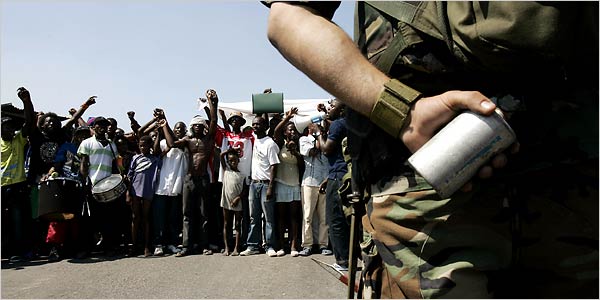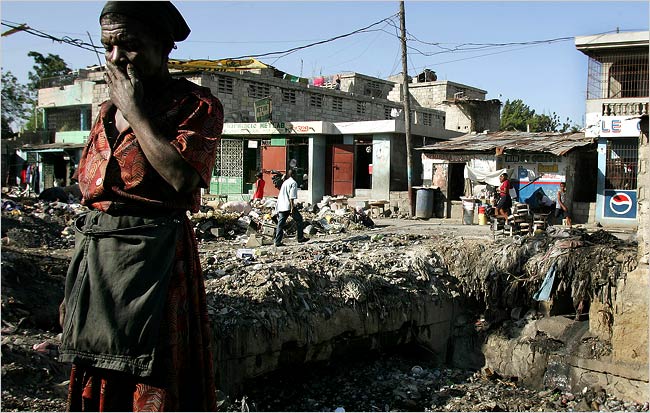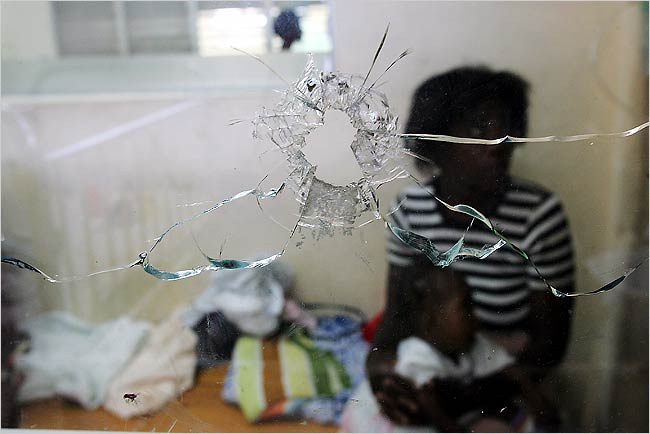| Want to send this page or a link to a friend? Click on mail at the top of this window. |
More Special Reports |
| Posted February 10, 2007 |
 |
|
Ariana Cubillos/Associated Press |
|
|
|
|
|
By MARC LACEY |
PORT-AU-PRINCE, Haiti, Feb. 5 — For years, street gangs have run Haiti right alongside the politicians. With a disbanded army and a corrupted wreck of a police force, successive presidents have either used the gangs against political rivals or just bought them off.
Recently, something extraordinary has occurred. President René Préval decided to take on the gangs and set the 8,000 United Nations peacekeepers loose on them, a risky move that will determine the security of the country and the success of his young government.
“We’re taking back Port-au-Prince centimeter by centimeter,” said Lt. Col. Abdesslam Elamarti, a peacekeeper from Morocco. “We’re pressing these gangs so the population can live in peace.”
The offensive by the United Nations forces, who arrived here in 2004 after the ouster of President Jean-Bertrand Aristide, began in earnest in late December. One of the fiercest battles took place on the morning of Jan. 25 with a raid by hundreds of United Nations forces on a gang hide-out on the periphery of Cité Soleil, this sprawling seaside capital’s largest and most notorious slum.
After a fierce firefight in which gang members fired thousands of shots, United Nations officials succeeded in taking over the hide-out, a former schoolhouse that gang members had once used to fire upon peacekeepers and to demand money from passing motorists. The United Nations said four gang members had been killed in the battle.
Other raids have followed, and though it is still too early to judge the operation, gang leaders seem to be on the run, and armored United Nations vehicles now rumble through the crowded streets of Cité Soleil.
[Some 700 United Nations peacekeepers raided strongholds in Cité Soleil before dawn on Friday trying to take control of abandoned buildings used by gang members. One person was killed and several others wounded, including two peacekeepers, United Nations officials said.
[“There will be no tolerance for the kidnappings, harassment and terror carried out by criminal gangs,” Maj. Gen. Carlos Alberto dos Santos Cruz, the commander of the United Nations forces, said in a statement on Friday. “I will continue to cleanse these areas of the gangs who are robbing the Haitian people of their security.”]
The biggest of the United Nations operations have been aimed at one of the most wanted and feared of all the gang leaders, an unlikely and unpredictable power broker in his 20s who goes simply by the name Evans. Evans and his groups have been linked to a rash of kidnappings in the capital, and lately his men have been locked in fierce battles with United Nations peacekeepers.
Within the confines of Cité Soleil, Evans’s every whim is enforced with absolute authority. Deeply superstitious, he recently said he suspected cats of bringing him bad luck after one appeared during a raid by United Nations troops on one of his hide-outs, local residents and United Nations officials said.
 |
Ruth Fremson/The New York Times |
| Residents are being paid to clear raw sewage and trash from a drainage ditch in Solino, a neighborhood pf Port-au-Prince, the Haitian capital. |
So he issued an order that all cats were to be killed in his patch of the slum. His gunmen would be rounding them up and roasting them, he told the people. When one woman resisted, he or one of his men shot her, United Nations officials say.
Evans and the other leaders now hide in the maze of tin-roofed shanties that are home to some 300,000 of Haiti’s urban poor. Meanwhile, the local population debates which is a more effective strategy for dealing with these young toughs, confronting or conversing with them.
Haiti, the poorest country in the Western Hemisphere, has a long tradition of politics mixed with thuggery. In the 1970s and ‘80s, François Duvalier and his son Jean-Claude employed the Tontons Macoute, dreaded paramilitary hoodlums.
____________ |
|
| Among the weapons used to win back Port-au-Prince: tear gas and Shovels. | |
____________ |
Mr. Aristide was elected president in 1990 and again in 2000 with the support of the poor. Gang leaders, who act as de facto spokesmen for long-neglected slums, gained entry to the presidential palace and helped dole out jobs and other spoils to their men.
In his initial months in office, Mr. Préval, who had been Mr. Aristide’s prime minister as well as president from 1996 to 2001, followed a similarly conciliatory tack. He negotiated with gang leaders, including Evans, inviting them at times to face-to-face meetings in the presidential palace, officials say.
But he has grown increasingly impatient with the gangs as they resisted surrendering their guns and continued wreaking havoc on Port-au-Prince.
The kidnapping spree at the end of last year was the last straw. As the country prepared for Christmas, street thugs began grabbing people off the street, taking them into the slums and demanding ransoms.
Then the kidnappers began singling out children. In one horrible episode, a teenage girl was killed and her eyes were gouged out. Then, a school bus of children was seized by gunmen, prompting many terrified parents to keep their children hidden at home.
Mr. Préval, who has support among Haiti’s poor as well as its elite, found his coalition government under attack as well, with opposition politicians in the Senate and Chamber of Deputies denouncing him for allowing the violence. The president changed course, calling off negotiations with the gangsters and giving the United Nations the go ahead to go after them.
Some local residents say that the raids are stirring up the gangs and that innocent people are getting caught up in the cross-fire.
David Wimhurst, the spokesman for the United Nations mission, said that the peacekeepers were careful to single out only combatants and that gang members had themselves killed civilians and then blamed the United Nations.
Not everybody agrees that confrontation is the best way of calming the slums. “The gang men can change,” insisted Meleus Jean, 45, a pastor who runs a tiny church in Cité Soleil and who was once almost hit by a stray bullet while delivering a Sunday morning sermon. “I talk to them and I think they are gang men because they have nothing else. Fighting them will not change them.”
One of those who has been criticized in the past for dealings with gang members has been Wyclef Jean, the Haitian-American rapper formerly of the Fugees. “The problem is much bigger than the gang leaders,” he said in a telephone interview from New York. “I’m not saying they are not part of the problem. When people are killing people, that’s a problem. But we don’t have enough conversation.”
But United Nations officials say the time for talk is over.
“If one of them goes to Préval and says, ‘I want to give up,’ and waves a white handkerchief, that is fine,” said Edmond Mulet, a Guatemalan diplomat in charge of the United Nations mission here. “That’s the kind of conversation we want.”
At the same time, nobody believes that arresting or killing the gang leaders will be enough to calm Port-au-Prince. The violence is linked, most say, to the dire poverty.
 |
Ruth Fremson/The New York Times |
| A window in the pediatric ward of a small hospital in Cité Soleil was shattred by a stray bullet of an unknown gunman. Nobody was hurt. |
“The people didn’t ask to be born here,” said Christy Jackson, 42, headmaster of a school in Cité Soleil. “We didn’t ask to live like this.”
The United States government recently set aside $20 million to create jobs for young people in Cité Soleil once the violence is quelled. In Solino, a neighborhood where the gangsters were chased away, people are being paid to clean garbage from a clogged drainage ditch.
Mr. Jean, the singer, has numerous social projects under way, including a program to bring giant mobile movie screens to poor neighborhoods, which have no cinemas.
Mr. Mulet, of the United Nations, said he believed that the gang leaders were beyond rehabilitation. “They’ve been killing people, kidnapping people, torturing people, raping girls,” he told reporters recently in Washington. “It is very difficult to reinsert into society someone like that. A psychiatric institution would be the best place to place them in the future — after we arrest them.”
Even if the gangsters are all rounded up, the country’s justice system is ill-equipped to handle them.
Justice is bought and sold in Haiti, with both police officers and judges routinely allowing bribes to determine guilt or innocence. Jails are packed with people awaiting trial, most languishing for years.
On top of that, more and more narcotics have begun flowing through Haiti to the United States, law enforcement officials say. It is Haiti’s weakened state that is the big attraction to narcotics traffickers, officials say.
In a recent report on Haiti’s woeful law enforcement apparatus, the International Crisis Group, a nonprofit group committed to preventing and resolving deadly conflicts, said that without urgent reform “the current escalation of organized violence and criminality may come to threaten the state itself.”
As bullets fly, everyone is under threat. One stray shot pierced the outer wall of a hospital in Cité Soleil recently. “We don’t know who shot it,” said Marie Yves Noël, the chief nurse. The bullet continued on through the maternity unit and then broke the glass of a pediatrics ward. Nobody was hit.
Copyright 2007 The New York Times Company. Reprinted from The New York Times, International, of Saturday, February 10, 2007.
| Wehaitians.com, the scholarly journal of democracy and human rights |
| More from wehaitians.com |